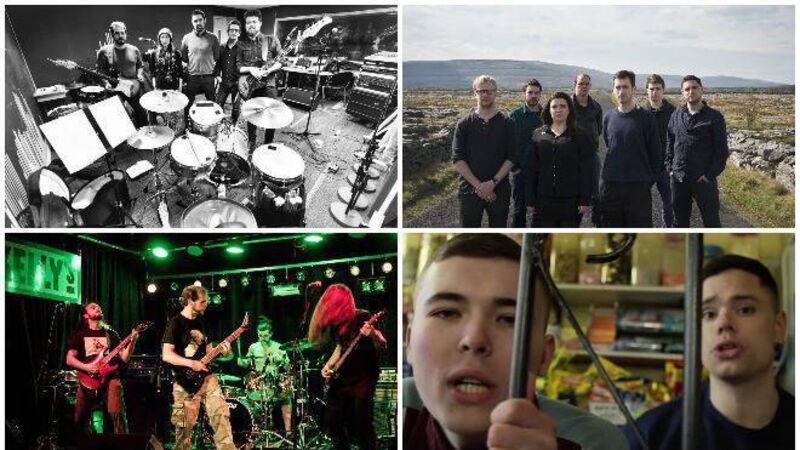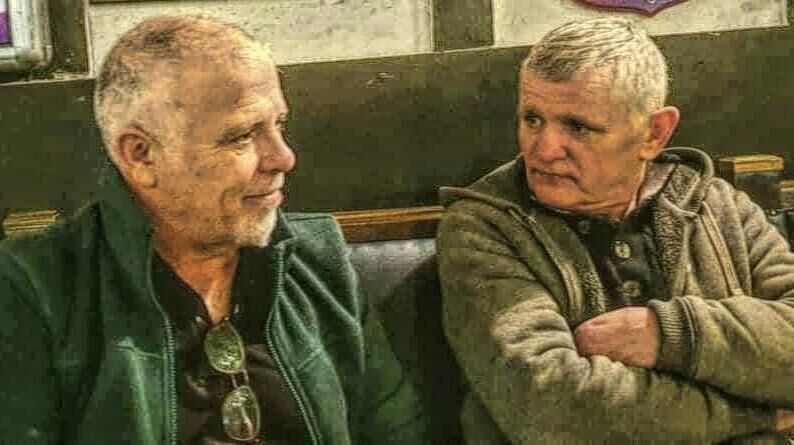Déanta in Éirinn: 5 Irish-language acts to check out for Seachtain na Gaeilge

Clockwise from top-left: IMLÉ, Ensemble Eriú, KNEECAP, Corr Mhóna
While there's always been a vein of deeper Irish history, mythos and language in our contemporary music output, there's seldom been a time like the present for music in the mother tongue.
In the same way a gentle resurgence can be seen in Irish and its Hiberno-English cousin across literature, podcasting (Motherfoclóir in particular being an easy listen for new speakers) and social media (follow TG4 on Twitter, go tapaidh), so too are we in a moment where the Irish language is part of the fertile ground from which the current wave of new music has grown.
From Raidió Rí-Rá's commissioned Irish-language versions of songs from popular Irish artists in the 2000s, like The Coronas and the Rubberbandits, to Denise Chaila's 'Anseo', the influence of the language varies from the readily-recognisable cúpla focal in the middle of a song, all the way up to new takes on the long-standing trad canon.
Here's a look at five artists, out of many, as we'll see, that are working the mother tongue into their tunes.
It's not often you get trad in a videogame.
So when you hear the voice of Ensemble Eriú singer Saileog Ní Cheannabháín in the middle of Dublin developers Dreamfeel's visual novel 'If Found', it's something very special indeed, with the high-end drones of 'Seachrán Sí' lending the affair an otherworldly atmosphere.
The trad-fusion seven-piece, led by Jack Talty and Neil Ó Loclainn, specialises in re-arranging Irish traditional music in the North and West Clare traditions with elements of modern minimalism, to stunning effect.
The Irish language, and broader cultural picture, has lent itself readily to hip-hop over the years, from the likes of Scary Éire and Captain Moonlight, to Irish-language efforts from the Rubberbandits and West Cork wordsmith Craic Boi Mental, as well as the all-Irish exploits of MC Muipéad, among others.
But as far as bars as Gaeilge, there's been very few artists to emerge from the Irish hip-hop underbelly quite like Belfast trio Kneecap.
Wordsmiths Moglaí Bap agus Mo Chara blend their accent and dialect with a distinctive gift for nimble linguistics, while producer DJ Provaí isn't shy of the 90s vibes, as heard in (the decidedly NSFW) 'Amach Anocht'.
Prior to the Covid crisis, they were on the cusp of crossover success, touring the US and headlining major venues at home, and while they're best known for their rowdy, outsized sense of humour, often referencing republicanism, they've also shown a serious side, recently paying tribute to Bap's late mother in a recent single.
Speaking of MC Muipéad: Irish-language collective IMLÉ, of whom the rapper is a part, run a bit of a gamut, bringing in elements of funk, hip-hop and R&B, and giving them an accented, Connemara dimension.
Their first album, released in 2016 on Gael Linn, is a joy, from the Rhodes-organ-toting 'Fún Orm', to the teenage pains of the introverted 'Ná Bac'.
Lockdown single 'Do Chuid Jeans', with the help of guest vocalist Roisín Seoighe, however, sees them really come into their own, channelling the little beauties we can find in the present moment into a Gaelgoir slow-jam, replete with lockdown-filmed video that, amusingly, includes an array of fan reactions.
Metal might not strike casual listeners as a natural home for the Irish language and tradition, but one need only look at the pain in our history for ample inspiration for the genre's heft and tumult.
Indeed, from veteran bands like Cruachán and Primordial, to the likes of An Beithíoch and the short-lived Sodb, there's been a wide intersection between metal's multifarious sub-genres and our cultural inheritance.
There's nothing quite like West Cork progressive metallers Corr Mhóna, though: writing and recording exclusively as Gaeilge, and drawing on their surroundings and nature for the imagery in their lyrics, they meld doomy, blackened sonic extremes with a mix of clean and screamed vocals to create something distinct in the genre.

Not full-time Gaelgoirs by any stretch, but Cork post-punk veterans Big Boy Foolish (including ex-members of Cork cult faves Nun Attax and Mean Features) have made the effort for this year's Seachtain, with vocalist Liam Heffernan translating the lyrics of their eponymous single without a hitch.
With a full album in their sights, perhaps a second disc of Gaelgoir-friendly noisemaking is in order?


